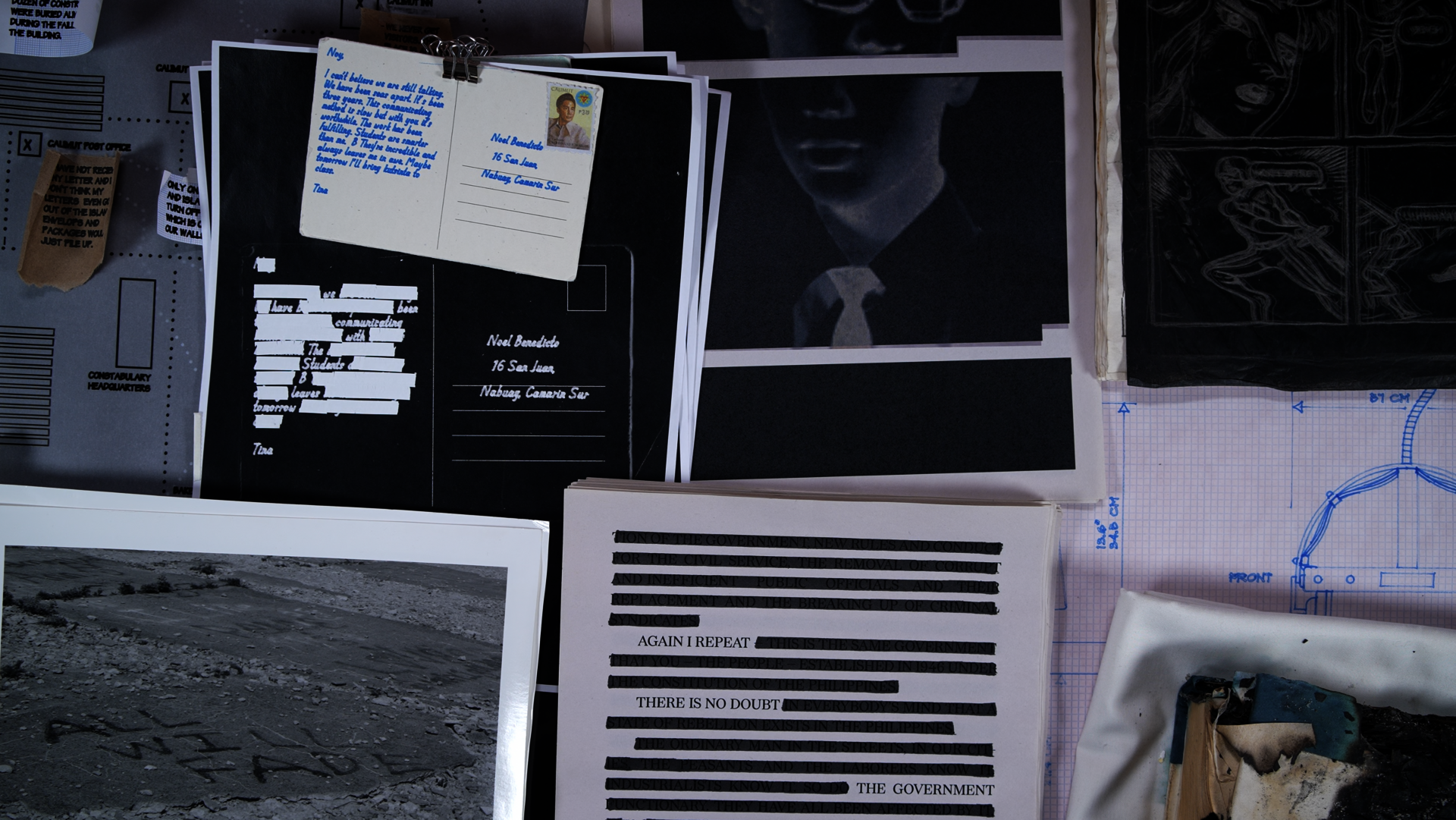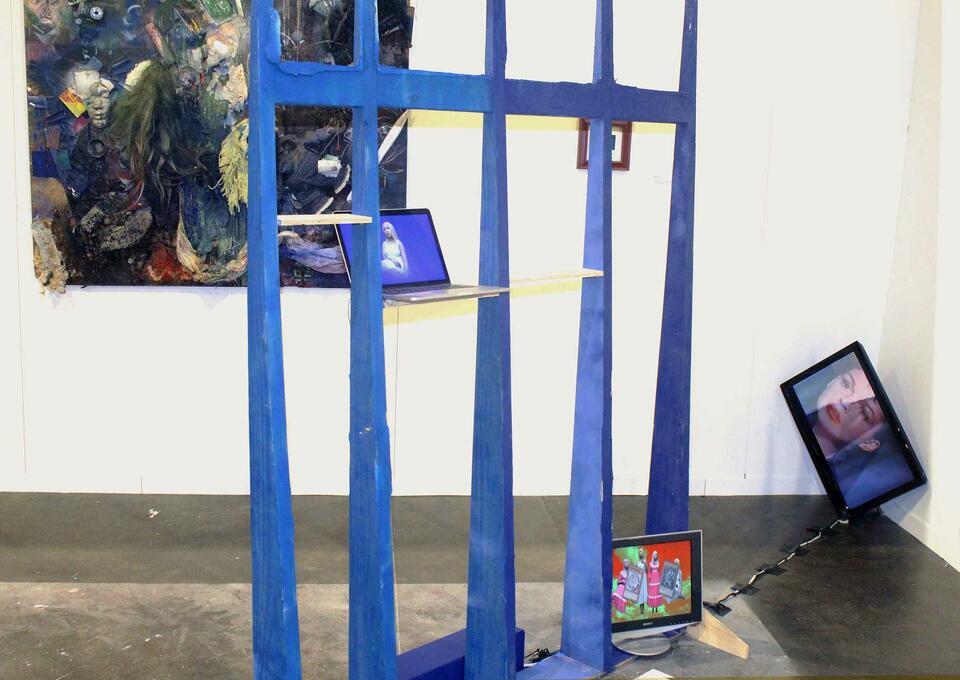Alec Figuracion
Soft Procedures
Looking through the soft lens—from the vantage point of a place one calls home, and steered by an interiority that feels a little too much sometimes—I am interested in the hazy, undefined subjects and instances that occur around the peripheries of our lenses: fuzzy imprints of memories, shifting notions of home, and shapeless narratives. Working primarily with the moving image, I investigate the multiple threads that might exist between them, and persistently shift and adjust the focus ring on the camera lens so as to embrace and celebrate multiplicities, and our collective definitions of softness.
Somewhere between a biographical documentary and a video essay, this film reassembles and puts together shards that have become fuzzy—the hazy memories left by my grandmother, and the inexact accounts of the stories she used to tell. Using archival clips, family photographs, and studio footage, this film is a narrated retelling by myself and my father of recollections, and passed down stories relating to the personal, and to Bicolanoa myths, lores and legends.
By utilizing the poetic and formal possibilities of the split-screen format, the stories and memories retold in this film are tugged, shaped, expanded, and complicated by way of associative editing, formal visual rhyming, and multiple metaphors. Sugar Glass hopes to present that the memories we frequently revisit and the iterations of the stories we tell ourselves and each other are always in states of malleability. This film aims to depict the nature of memories and stories—constantly being remembered, reconstructed, and retold.
Video file
Video
05 mins, 57 secs
2022
To go for a walk is to take the body outside as and retreat frominto the mind. To walk is to momentarily lead oneself astray — to be excised from the objective of a destination. For someone in a foreign place, it can be a moment to get lost in the memories of home. For that someone, taking a walk through Google Street View is an opportunity to be reminded of that home.
Sometimes I Feel Like Walking is part video essay and part counter-map of a hometown. Using archival footage, personal and archival images, and text superimposed on a Google Street View walkthrough, this film tells a brief biography of a place framed through the lens of the personal narrative. By excavating recollections and disorientations from within a tool that is used to survey and objectify, this work — or this walk — presents an uncertain, fragmented, and hazy personal cartography of a home against the fidelity of maps, digital or otherwise. This work explores the tensions that arise between the instability of memories and narrativization imposed by maps; between our eye-level perception of the world and the view of it from above.
It is said that every time a memory is recalled, it changes — the mind distorting the image with each retelling. How can the memories of a place be reconstructed and rewritten against the narratives imposed by some sort of power and system? How can the complex and ever-evolving notions of a home be reclaimed from the exactness and resolution of our maps?
Video file
Video
09 mins, 05 secs
2023
“Writing about graphic design and its history in the Philippines is a quandary because there is barely any reference material, local or otherwise, dedicated to the subject,” begins Clara Balaguer in her essay, Tropico Vernacular (2016)
Tropico Obscuro is an exercise of adaptation from text to video. This work visualizes Balaguer’s essay, Tropico Vernacular, into a motion title sequence and supercut of typographic and formal clutter and abundance — a discernible quality of the Filipino graphic design vernacular and visual culture of a nation. A hyper-condensed translation of an already brief text about an unstudied history, Tropic Obscuro becomes a celebration of visual maximalism and an abandon of defining a culture of multitudes.
Video file
Video,
Motion
00 min, 58 secs
The Forgetting Syllabus is an archival initiative undertaken by an unnamed artist investigating and documenting what remains of Calimut Island, a small and remote island in the Philippines placed under Martial Law and where inhabitants are afflicted with some sort of progressive amnesia.
On the 15th of March 2023, the initiative exhibited an archive of the artist’s ongoing research and documentations in a small room at the Center for Integrative Technologies, Providence, RI. They presented a collection of found artifacts from the island — some gathered, some passed down, some materialized by speculation. The archive included redacted poetry out of the Martial Law declaration documentations, a samizdat comic book, blueprints of a memory modification device, large format photographs depicting an unknown girl at the beach, postcards containing cryptic codes between distant lovers, a burnt book covered in sand, a map of a cartographer’s effort to piece together his last memories of the land, among others. Each one a fragment of a narrative that had been erased by an atrocity; each one a reminder of a brutal history thrown in a violent cycle of revision and distortion.
In an audio recording playing in the space during the exhibition, the artist claims that, “... memory is a form of resistance and remembering is radical.”
Image

Installation,
Objects
2023
EXHIBITION IMAGES
